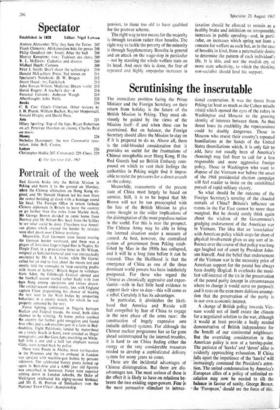Scrutinising the inscrutable
The immediate problem facing the Prime Minister and the Foreign Secretary on their return from holiday is the future of the British Mission in Peking. They must ob- viously be guided by the views of the Mission itself—if and when these can be ascertained. But on balance, the Foreign Secretary should allow the Mission to stay on if it is prepared to do so. Above all, there is the cold-blooded consideration that it „provides an outlet for the frustrations of Chinese xenophobia over Hong Kong. If the Red Guards had no British Embassy com- pound on which to vent their feelings the authorities in Peking might find it impos- sible to resist the pressures for a direct assault on the colony.
Meanwhile, assessments of the present state of China must largely be based on surmise. Still, it is to be hoped that Mr Brown will not be too preoccupied with the fate of the British Mission to give some thought to the wider implications of the disintegration of the most populous nation in the world. For this is now the prospect. The Chinese Army may be able to bring the internal situation under a measure of control. At best, however, the centralised system of government from Peking estab- lished by Mao in the 1950s has collapsed, and it will be a long time before it can be restored. Thus the likelihood is that the emergence of China as one of the three dominant world powers has been indefinitely postponed. For those who regard the Chinese as chronically aggressive and expan- sionist—with in fact little hard evidence to support their view to date—this will come as a relief. Certainly it has its advantages.
In particular, it diminishes the likeli- hood that America and Russia will feel compelled by fear of China to engage in the next phase of the arms race: the construction of hugely expensive ABM (missile defence) systems. For although the Chinese nuclear programme has so far gone ahead uninterrupted by the internal troubles, it is hard to see China finding either the energy or the very considerable resources needed to develop a sophisticated delivery system for many years to come.
These are the incidental advantages of Chinese disintegration. But there are dis- advantages too. The most serious of these is the effect it is likely to have on relations be- tween the two existing super-powers. Fear Is the most persuasive stimulant to interna- tional cooperation. It was the threat from Peking (at least as much as the Cuban missile crisis) which opened the eyes of the rulers in Washington and Moscow to the growing identity of interests between them. As that threat loses its credibility the repercussions could be doubly dangerous. Those in Moscow who resent their country's repeated ' humiliations at the hands of the United States (humiliations which, it is only fair to , add, have not usually been of America's Choosing) may feel freer to call for a less responsible and more aggressive foreign policy. Those in Washington who want to -dispose of- the Vietnam war before the onset of the 1968 presidential election campaign will feel readier to insist on the uninhibited pursuit of rapid military victory.
So what should be the outcome of the Foreign Secretary's scrutiny of the clouded entrails of China? Britain's influence on events in the Far East cannot be more than marginal. But he should surely think again about the wisdom of the Government's grudging endorsement of the American war in Vietnam. The idea that an `association' , with American policy which stops far short of physical involvement gives us any sort of in- fluence over the course of that policy was long ago laughed out of court by President John- son himself. And the belief that endorsement of the Vietnam war is the necessary price of American support for the pound has always been doubly illogical. It overlooks the mani- fest self-interest of the us in the preservation of the pound parity (except in circumstances where. to change it would serve no purpose); and it rests on the even more dubious assump- tion that the preservation of the parity is in our own economic interest.
A change of British policy towards Viet- nam would not of itself create the climate for a negotiated solution to the war, although it would at least provide a badly needed demonstration of British independence for the benefit of our continental neighbours.
But the overriding consideration is that American policy is now at a turning-point.
The patience of `hawks' and 'doves' alike is evidently approaching exhaustion. If China falls apart the impatience of the `hawks' will Increasingly command the President's Wen- , (ion. The united condemnation by America's .European allies of a policy of unlimited es- , calation may now be needed to tilt the balance in favour -of sanity. George Brown, ; the `European,' should see the force of this.






























 Previous page
Previous page